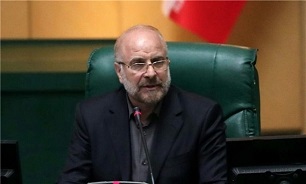New Anti-Syria Sanctions Indicative of Enemies’ Military Defeat
 Qalibaf made the remarks in a meeting with Syrian envoy to Tehran, Adnan Hassan Mahmoud, on Monday.
Qalibaf made the remarks in a meeting with Syrian envoy to Tehran, Adnan Hassan Mahmoud, on Monday.
The reason behind imposition of economic sanctions against Syrian people (under the so-called Caesar Act) is that the enemies have failed in the military and security war, he said.
History bears witness to the deep and unbreakable bond between Iran and Syria which originates in the beliefs of the two nations, the speaker noted.
“Iran has always considered Syria to be in the frontline of the Resistance Front, Qalibaf said, adding, “This began with the glorious triumph of the Islamic Revolution and has come from strength to strength through the course of time.”
“Today, we are witnessing that enemies of Syria, Iran and Islamic Ummah are disappointed,” Iran’s speaker underlined.
Adnan Hassan Mahmoud, for his part, pointed to the valor and prominent role of martyr Lt. Gen. Soleimani in the fight against terrorism and added, “We all know the key and constructive role of martyr Gen. Soleimani in Syria which was unique and we hope that his path will be continued by IRGC Quds Force Commander Brigadier General Qa’ani.”
He glorified the name and memory of martyr Gen. Soleimani, saying, “Martyr Soleimani donated his pure blood to preserve the Axis of Resistance and we will continue his path steadfastly.”
Lieutenant General Soleimani and Deputy Commander of Iraq's Popular Mobilization Forces (PMF) Abu Mahdi al-Muhandis were assassinated in a US drone strike on Baghdad International Airport in Iraq on January 3.
On January 8, the IRGC Aerospace Force started heavy ballistic missile attacks on US Ein Al-Assad airbase in Southwestern Iraq near the border with Syria and a US operated airbase in Erbil in retaliation for the US assassination of General Soleimani.
Ein Al-Assad is an airbase with a 4km runway at 188m altitude from sea levels, which is the main and the largest US airbase in Iraq. Early reports said the radar systems and missile defense shields in Ein Al-Assad failed to operate and intercept the Iranian missiles. Unofficial reports said the US army's central radar systems at Ein Al-Assad had been jammed by electronic warfare.
The second IRGC reprisal attack targeted a US military base near Erbil airport in Iraqi Kurdistan Region in the second leg of "Martyr Soleimani" reprisal operation.
Iraq said the attacks had not taken any toll from its army men stationed at these two bases. The US army had blocked entrance into Ein Al-Assad to everyone, including the Iraqi army.
It was the first direct attack on the US army ever since world war two.
The IRGC officials said none of the missiles had been intercepted.
Iran has repeatedly stressed that Ein Al-Assad missile attack was just the start of its revenge for the US assassination of its top General, and not the end of it. Tehran has declared expulsion of the US troops from the region as its ultimate goal.
message end/